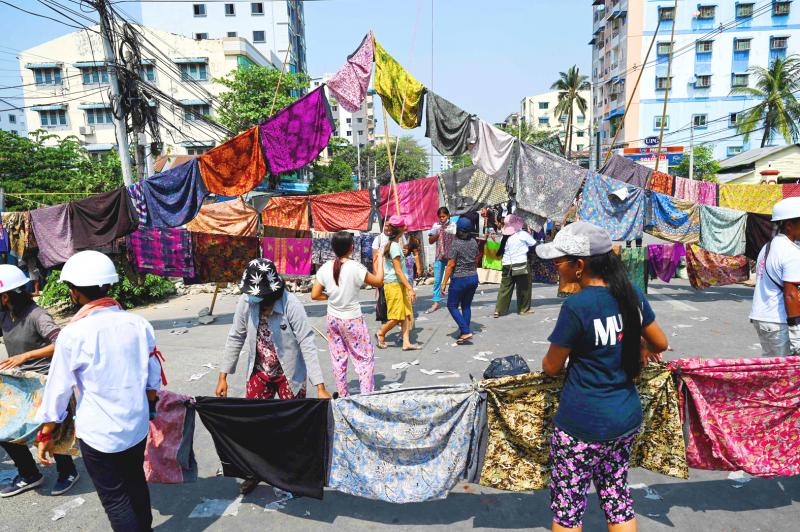Sarong-like cloths strung out on lines might seem innocuous, but long-held superstitions around women’s clothes appear to have stopped security forces in their tracks as they move to quell an uprising against a coup by the junta in Myanmar.
The country has been in an uproar since the military ousted the civilian government and seized power on Feb. 1, triggering mass protests that the junta has sought to quash with increasingly lethal force.
They have used tear gas, stun grenades, rubber bullets and sometimes live rounds against protesters, who are responding with imaginative tactics of their own.

Photo: AFP
The latest involves hanging women’s undergarments and long skirts — or longyis — on a clothesline across the street.
According to old Burmese traditions, women’s lower parts and the garments that cover them can sap men’s power, known as hpone.
“If they go under a women’s longyi, that means their hpone is destroyed,” pro-democracy advocate Thinzar Shunlei Yi said.
Some soldiers are unwilling to touch a women’s longyi for fear that it could hurt their chances on the front lines.
“When the community hangs the longyi above the rope, [police and soldiers] can’t go in the streets, they can’t cross it and they have to take it down,” Thinzar Shunlei Yi said.
Women are wielding the superstition as a defensive strategy.
Swooping clotheslines of longyis and knickers have suddenly decorated Yangon, from the buzzing San Chaung township to the city’s rural outskirts, where pictures shared on Facebook showed a soldier standing atop a truck to remove one.
Some of the longyis also have images of Burmese Army Senior General Min Aung Hlaing’s face pasted on them, in a further superstitious ploy.
The junta leader features prominently on posters plastered onto the ground across Yangon — protesters believe that it could slow security forces reluctant to step on his portrait.
Yangon has completely transformed since the coup.
Massive makeshift barricades are commonplace, with communities stacking bricks, old tires, tables and barbed wire to prevent authorities from entering their districts.
Some neighborhoods descend into chaos daily as now-seasoned demonstrators take to the streets in defiance of truckloads of police and soldiers. Plastic bags full of water — to help diminish the sting of tear gas in the air — are distributed in hotspots of unrest.
Designated people also carry buckets of water full of soaked blankets, ready to wrap them around gas canisters, while others hold mirrors as shields to confuse their attackers.
As they flee security forces bearing down on them, they release plumes from fire extinguishers to gain precious time — scattering to prearranged escape routes.
Even with all their ingenuity — thanks to some tactics borrowed from Hong Kong and Thailand’s pro-democracy movements — the field remains unequal, Thinzar Shunlei Yi said.

STAGNATION: Once a bastion of leftist politics, the Aymara stronghold of El Alto is showing signs of shifting right ahead of the presidential election A giant cruise ship dominates the skyline in the city of El Alto in landlocked Bolivia, a symbol of the transformation of an indigenous bastion keenly fought over in tomorrow’s presidential election. The “Titanic,” as the tallest building in the city is known, serves as the latest in a collection of uber-flamboyant neo-Andean “cholets” — a mix of chalet and “chola” or Indigenous woman — built by Bolivia’s Aymara bourgeoisie over the past two decades. Victor Choque Flores, a self-made 46-year-old businessman, forked out millions of US dollars for his “ship in a sea of bricks,” as he calls his futuristic 12-story

FORUM: The Solomon Islands’ move to bar Taiwan, the US and others from the Pacific Islands Forum has sparked criticism that Beijing’s influence was behind the decision Tuvaluan Prime Minister Feletei Teo said his country might pull out of the region’s top political meeting next month, after host nation Solomon Islands moved to block all external partners — including China, the US and Taiwan — from attending. The Pacific Islands Forum (PIF) leaders’ meeting is to be held in Honiara in September. On Thursday last week, Solomon Islands Prime Minister Jeremiah Manele told parliament that no dialogue partners would be invited to the annual gathering. Countries outside the Pacific, known as “dialogue partners,” have attended the forum since 1989, to work with Pacific leaders and contribute to discussions around

END OF AN ERA: The vote brings the curtain down on 20 years of socialist rule, which began in 2005 when Evo Morales, an indigenous coca farmer, was elected president A center-right senator and a right-wing former president are to advance to a run-off for Bolivia’s presidency after the first round of elections on Sunday, marking the end of two decades of leftist rule, preliminary official results showed. Bolivian Senator Rodrigo Paz was the surprise front-runner, with 32.15 percent of the vote cast in an election dominated by a deep economic crisis, results published by the electoral commission showed. He was followed by former Bolivian president Jorge “Tuto” Quiroga in second with 26.87 percent, according to results based on 92 percent of votes cast. Millionaire businessman Samuel Doria Medina, who had been tipped

Outside Havana, a combine belonging to a private Vietnamese company is harvesting rice, directly farming Cuban land — in a first — to help address acute food shortages in the country. The Cuban government has granted Agri VAM, a subsidiary of Vietnam’s Fujinuco Group, 1,000 hectares of arable land in Los Palacios, 118km west of the capital. Vietnam has advised Cuba on rice cultivation in the past, but this is the first time a private firm has done the farming itself. The government approved the move after a 52 percent plunge in overall agricultural production between 2018 and 2023, according to data